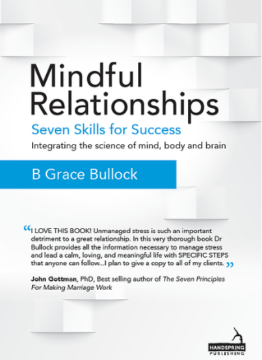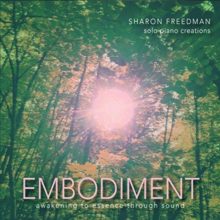Have you ever had one of those moments where it seems that the entire world is out to remind you to get back on track? I had one of those last week. I was driving to teach a yoga class and a woman in traffic slid in front of me, much too close for comfort. I laid on my horn and much to my surprise I hurled a profanity at her (in the last eight years I have used a profanity here and there, but I have not thrown one at a person). It shocked me to hear it coming out of my mouth. As I took my hand off the horn, it kept going and I could not get it to stop. I pulled over and searched my mind for what to do. I looked up and an angel in coveralls was running towards my car gesturing for me to pop my hood. In mere moments, he had pulled the fuse and my car stopped honking.
Amid the whole experience, I was receiving the message to wake up. Life is stressful and I had been allowing my stress response to dictate my life and my day. For me to respond to someone doing something dangerous in that way meant that I had let me anxiety creep up. As I pulled away from the angel in coveralls I resolved to take a deeper look at my daily life and draw proper boundaries around work and stress.
Drawing healthy boundaries around the things in life that stress us out is a stress management tool. This means leaving work at work, taking breaks (like a breathing break) in the middle of the day, and walking away from devices after a certain point in the day. For those of us that work from home, it can be difficult to step away from work, because it is right there. One tip for the self-employed is to establish boundaries around emails. Forbes.com had an article of tips from successful business people and it was mentioned that they only check emails 2 – 3 times a day, while most of their time is spent on money making projects. Apply that wisdom to social media as well and you might find your productivity, energy, and enthusiasm increase, while stress levels decrease.
Another healthy boundary tip is to take time off. Go away for a weekend, leave your computers and tablets at home, utilize the away message feature on your emails, and tell everyone you will be unreachable. Take a retreat, or make your own at home retreat. You work hard and you deserve the gift of self-care. You could even come join us at a 5-day Yoga for Mood Management in The Bahamas – warm sand, sun, yoga, and cool ocean. We may even have a weekend workshop coming up in your area.
Wishing you restoration and healthy boundaries,
Rose
Research: Yoga reduces depression & anxiety in elderly hospice patients
 Researchers designed a yoga program for elderly women residing in a hospice in Puducherry (formerly Pondicherry), India. The program included simple warm-ups, movement coordinated with breath, yoga postures, yoga breathing practices and relaxation. The practice was 60 minutes twice a week. 40 women were divided into two groups, the yoga group and the wait-list. Researchers measures anxiety, depression, and self-esteem before and after; anxiety and depression were reduced while self-esteem increased. The researchers conclude that yoga should be a part of health-care facilities to enhance the quality of life and give a sense of hope.
Researchers designed a yoga program for elderly women residing in a hospice in Puducherry (formerly Pondicherry), India. The program included simple warm-ups, movement coordinated with breath, yoga postures, yoga breathing practices and relaxation. The practice was 60 minutes twice a week. 40 women were divided into two groups, the yoga group and the wait-list. Researchers measures anxiety, depression, and self-esteem before and after; anxiety and depression were reduced while self-esteem increased. The researchers conclude that yoga should be a part of health-care facilities to enhance the quality of life and give a sense of hope.
If it works this well for the elderly, why not you? Consider adding a daily practice of some gentle stretching followed by the LifeForce Yoga Chakra Clearing Meditation.
Research: Nasal Breathing and the limbic system
 Researchers at Northwestern Medicine have linked nasal breathing to increased emotional processing and memory. Nasal breathing directly impacts the “smelling” part of the brain (the olfactory bulb and cortex). The oscillations in the olfactory bulb and cortex synchronizes activity in the limbic brain, including the amygdala and hippocampus. During nasal inhalation (as opposed to breathing through the mouth) individuals in the study could identify faces with a fearful expression faster. They were also better able to recall faces if they had been inhaling through the nostrils when they first saw the face. Another way to think of these results is that when we are engaged in nasal breathing we are more alert and faster at responding to our surroundings than if we are mouth breathing. The exhalation through the nostrils enables us to calm our heart rate and activate the resting portion of the nervous system (the parasympathetic nervous system).
Researchers at Northwestern Medicine have linked nasal breathing to increased emotional processing and memory. Nasal breathing directly impacts the “smelling” part of the brain (the olfactory bulb and cortex). The oscillations in the olfactory bulb and cortex synchronizes activity in the limbic brain, including the amygdala and hippocampus. During nasal inhalation (as opposed to breathing through the mouth) individuals in the study could identify faces with a fearful expression faster. They were also better able to recall faces if they had been inhaling through the nostrils when they first saw the face. Another way to think of these results is that when we are engaged in nasal breathing we are more alert and faster at responding to our surroundings than if we are mouth breathing. The exhalation through the nostrils enables us to calm our heart rate and activate the resting portion of the nervous system (the parasympathetic nervous system).
Yoga breathing is done through the nostrils, with a couple of exceptions. In LifeForce Yoga we use a 4:4 count breath to gently energize (inhale through the nose for a slow count of 4 and exhale through the nose for a slow count of 4) and a 4:6 count breath to calm. The next time you learn new information, inhale through your nose.
Research: Two New Studies on Yoga for Depression
 One study measured the effect of yoga on heart rate variability (the ability of the heart to recovery quickly from stress and exertion) and depressive symptoms in women. 26 sedentary women with depression were randomized into two groups. The yoga group had 60 minute sessions twice a week for 12 weeks which included breathing exercises, yoga poses, and relaxation. The yoga group had a significant increase in heart rate variability and decrease in depressive symptoms and perceived stress.
One study measured the effect of yoga on heart rate variability (the ability of the heart to recovery quickly from stress and exertion) and depressive symptoms in women. 26 sedentary women with depression were randomized into two groups. The yoga group had 60 minute sessions twice a week for 12 weeks which included breathing exercises, yoga poses, and relaxation. The yoga group had a significant increase in heart rate variability and decrease in depressive symptoms and perceived stress.
The second study, conducted by Chris Streeter, MD and co-authored by Drs Brown and Gerbarg looked the effects of yoga and coherent breathing on major depressive disorder. Participants were randomized into two groups, one group receiving three 90-minute classes a week with home practice, and the other receiving two 90-minute classes a week plus home practice for 12 weeks. The yoga practice consisted of Iyengar Yoga with an emphasis on backbends and inversions, 10 minutes for relaxation and transition, ending with 20 minutes of coherent breathing (a practice of nasal breathing at a rate of five breaths per minute). Participants experienced a significant reduction of depressive symptoms after the 12 weeks. Practice three times a week had a greater impact than practice twice a week. Learn more about Coherent Breathing in Drs Brown’s & Gerbarg’s book, The Healing Power of the Breath.
Training: LifeForce Yoga Retreat & Training in Sunny Bahamas!
March 29 – April 2
Sivananda Ashram Yoga Retreat
Paradise Island, Bahamas
As the Nor’easter storm passes through the east coast, we are even more excited to escape the winter weather for our upcoming retreat. As a part of this program, we will practice movement, sound, breathing, visualization, intention setting, meditative relaxation, strategies for working with negative self-talk. During sessions you will have the opportunity to practice leading techniques with a partner in the program. In addition to LifeForce Yoga, you will get a chance to practice yoga with the ashram, chanting in the morning and the evening, a silent beach walk, presentations from teachers in other modalities (as a part of the regular Ashram schedule), walking on the beach and swimming in the ocean. This training can be taken as Part A of our Modular Training. Nourish and refresh body, mind and spirit, while you train with Amy Weintraub & Rose Kress.

Review: Mindful Relationships: Seven Skills for Success – Integrating the Science of Mind, Body and Brain By B Grace Bullock, PhD
Reviewed by Liz Payne-Merideth
 Stress. Sigh. I have a long list of must-reads, and another on stress might not have been my call, but Mindful Relationships came my way. The grey sans-serif cover put me off, but I plunged in and I’m glad. Wow! What a gift! Research Scientist, Psychologist, Yoga Therapist, and Mindfulness Expert, B Grace Bullock, PhD, hit it out of the park with this accessible guide to increasing personal resilience around physiological stress and enjoying successful relationships.
Stress. Sigh. I have a long list of must-reads, and another on stress might not have been my call, but Mindful Relationships came my way. The grey sans-serif cover put me off, but I plunged in and I’m glad. Wow! What a gift! Research Scientist, Psychologist, Yoga Therapist, and Mindfulness Expert, B Grace Bullock, PhD, hit it out of the park with this accessible guide to increasing personal resilience around physiological stress and enjoying successful relationships.
Not another ”couples” book by any means, Mindful Relationships is a masterful resource for individuals as well as for organizations and leaders. Choosing to feel ’peaceful and grounded’, over ’seriously stressed’ is a no-brainer, but Bullock underscores the need for a user-friendly approach that works even to sustain strong social systems and behavior.
I’m aware that our existence depends on relationship. I know that chronic stress undermines our best efforts at being present, and connecting, and loving. Like many of us, I take stress for granted, but Bullock weaves relatable anecdotes with deep research, humor, and personal experience, so I read on with interest. In fact, the more I read, the more I wanted to read. Persistent tension creates a total dysregulation of the mind, body and brain. Instead of relating with sound communication and proper appraisals of our emotions, relentless flooding can keep us on primal defense overload – withdrawn and hostile, and that’s no way to live.
Enter Bullock’s BREATHE model. BREATHE is an acronym for her evidence-based method which calls for a commitment to self care and uses intentional breathing as a gateway to mindfulness. Her Seven Skills are powerful tools that anyone can follow: Breath Awareness, Regulating your autonomic nervous system, Experiencing your emotions, Appraising your mindset, Taking a purposeful pause, Humor, Engaging others differently. Each chapter explores the approach further and includes an exercise.
Mindful Relationships is a treasure trove of sane insight and information, and Bullock’s advances will leave you wanting to try her many experiential exercises. Whether you need help de-stressing or connecting, or both, I highly recommend adding this elegant guide to your library.
Media Mention: Sharon Freedman CD “Embodiment: awakening to essence through sound”
Reviewed by Rose Kress
These  magical piano solos have their origins in the elemental world, and beckon the listener to actively engage with them in order to assist in evolving a new earth consciousness. The pieces on this CD are calming, entrancing, and engaging at the same time. Sharon says of her work: “these musical notes and movements often came to me with their corresponding energies as gentle visitors from another dimension. They have embraced me, taught me, and inspired me, and continue to do so. Their awakened consciousness had fully collaborated in the development of this music that intensely calls to e a felt experience and foster a new consciousness on the earth.” In each piece, the connections with the elements are apparent and at times entrancing. This CD is a beautiful piece of work that is moving. This is a perfect CD for use in LifeForce Yoga as it sets a peaceful tone, without being intrusive. I met Sharon during my recent trip to New Jersey and was exposed to her music during car rides, a chiropractic adjustment, and yoga. I found her music enhanced my experiences and allowed me to be present.
magical piano solos have their origins in the elemental world, and beckon the listener to actively engage with them in order to assist in evolving a new earth consciousness. The pieces on this CD are calming, entrancing, and engaging at the same time. Sharon says of her work: “these musical notes and movements often came to me with their corresponding energies as gentle visitors from another dimension. They have embraced me, taught me, and inspired me, and continue to do so. Their awakened consciousness had fully collaborated in the development of this music that intensely calls to e a felt experience and foster a new consciousness on the earth.” In each piece, the connections with the elements are apparent and at times entrancing. This CD is a beautiful piece of work that is moving. This is a perfect CD for use in LifeForce Yoga as it sets a peaceful tone, without being intrusive. I met Sharon during my recent trip to New Jersey and was exposed to her music during car rides, a chiropractic adjustment, and yoga. I found her music enhanced my experiences and allowed me to be present.
Contributors
Rose Kress, ERYT-500, LFYP-2, YACEP, Director of LifeForce Yoga, author of Mantra Chanting with Rose and Pathways to Relaxation.
Liz Payne-Merideth, BA, RYT is LifeForce Yoga® Healing Institute’s Tucson-based Operations Director. She completed LifeForce Yoga® Practitioner Level 1 Training in January, and will begin the mentoring phase soon. Liz also looks forward to LFYP L2 training!
